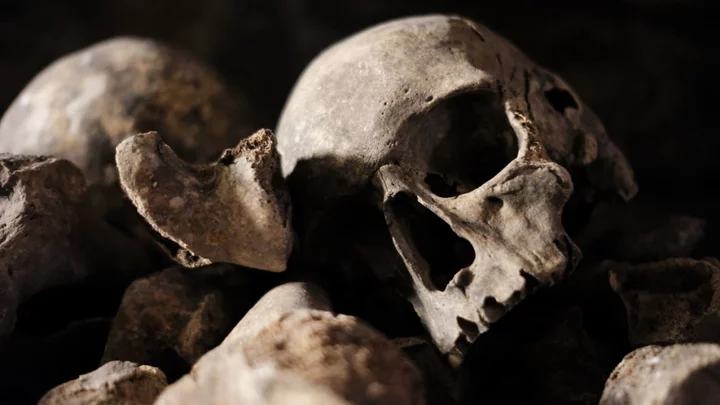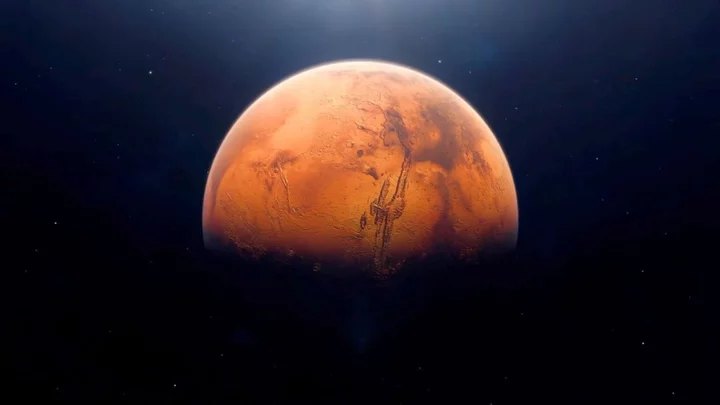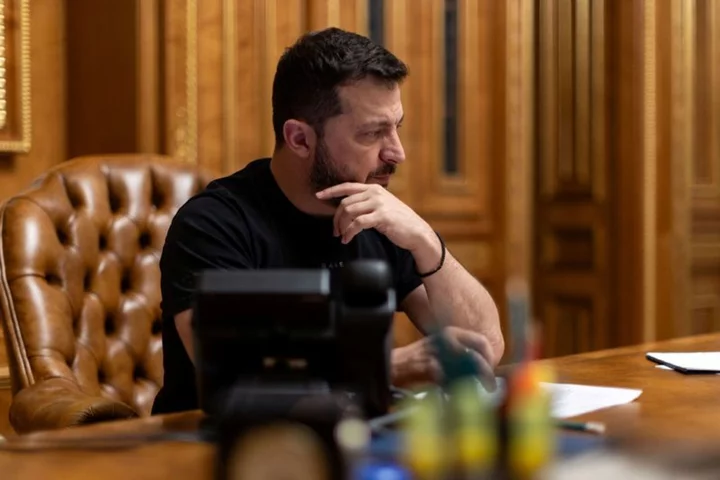
Deion Sanders entirely unpleased with win over Arizona State
Deion Sanders' Colorado Buffaloes may have improved to 4-2 on the season with their first win in conference play, but he is not the least bit pleased with how his rebuilding team played. Here is what he said after the win over Arizona State on Saturday.
1970-01-01 08:00

Scientists warn humanity has a '1 in 6' change of dying out this century
In 2020, philosopher Toby Ord published The Precipice, a book on the risk of human extinction. The chances of "existential catastrophe" for humanity in the next century according to Ord? One in six. It was a shocking number that alarmed many. After years of being flooded with warnings over climate change, rogue AI, nuclear weapons and pandemics, it's hard to disagree that humans face worrying chances. In his book, Ord discusses a number of potential extinction events, some of which can be examined through history. His research involved looking at the number of space rocks that have hit the moon over its history to figure out the likelihood than an extinction-sized asteroid hitting Earth. This was, in fact, looked at in 2022 by French scientists Jean-Marc Salotti, he calculated the odds of an extinction-level hit in the next century to be roughly one in 300 million. By contrast, Ord estimated the risk to be one in a million, although he does point out a considerable degree of uncertainty. Probabilities can be hard to understand in this context. Traditional probability, for example, relies on observations and a collection of repeated events, but human extinction would be a one-off. But there is another way to think if, called Bayesianism, after the English statistician Thomas Bayes. It sees probabilities as a ranking system of sorts. Specific number predictions shouldn't be taken so literally, but rather compared to other probabilities to understand the likelihood of each outcome. Ord's book contains a table of potential causes of extinctions, accompanied by his personal estimates of their probability. From a Bayesian perspective, we can view these as relative ranks. Ord thinks extinction from an asteroid strike (one in a million) is much less likely than extinction from climate change (one in a thousand). However, even using Bayesianism traditionally requires the incorporation of observational evidence. So, what do we make of Ord's "one in six"? Well it's better to take it less literally but to think of it as a warning, to jump start action on issues such as climate change to hopefully reduce the risk of human extinction in the next century. Sign up to our free Indy100 weekly newsletter Have your say in our news democracy. Click the upvote icon at the top of the page to help raise this article through the indy100 rankings.
1970-01-01 08:00

Scientists have just discovered a sixth taste to join salty, sweet, sour, bitter and umami
We're all familiar with the different basic tastes - sweet, sour, salty, bitter, and umami - but now scientists have found a sixth one where the tongue detects ammonium chloride. Research from USC Dornsife has discovered that protein receptors on the tongue not only respond to sour taste but also to ammonium chloride as well. Scientists were very much aware that the tongue responds to ammonium chloride, but haven't been able to specify which exact protein receptors... until now. The protein OTOP1 is responsible for this which can be found in the cell membranes and forms a channel for hydrogen ions moving into the cell. Whenever we taste anything that's particularly sour such as vinegar or lemon juice, OTOP1 is able to detect the acidity found in both of those. Therefore, given that ammonium chloride similarly affects the concentration of hydrogen ions within a cell, research was carried out on whether OTOP1 protein would react to this too. After lab-grown human cells with OTOP1 protein were created and exposed to acid or to ammonium chloride, the team found that ammonium chloride was a "strong activator" of OTOP1. “We saw that ammonium chloride is a really strong activator of the OTOP1 channel. It activates as well or better than acids,” Dr Emily Liman, a professor of biological sciences at USC Dornsife and study author. Now, perhaps you're wondering what ammonium chloride tastes like, one example of where it can be found is in salt liquorice candy which is popular in Nordic countries. “If you live in a Scandinavian country, you will be familiar with and may like this taste,” Dr Liman added. Though the flavour can be of an acquired taste and one that many may not be a fan of - but there is an explanation for this. “Ammonium is found in waste products – think of fertilizer – and is somewhat toxic, so it makes sense we evolved taste mechanisms to detect it,” Dr Liman explained. Sign up to our free Indy100 weekly newsletter Have your say in our news democracy. Click the upvote icon at the top of the page to help raise this article through the indy100 rankings.
1970-01-01 08:00

Israeli music festival: Londoner's son fled militant attack
Elliot Sorene, a London-based surgeon, describes how his son escaped the attacks in Israel.
1970-01-01 08:00

Perseverance rover captures stunning blue sunset on Mars
Mars is often called the Red Planet, but a recent image captured by NASA’s Perseverance rover from the surface would go some way to contradicting that. Earlier this year, Perseverance snapped a sunset from Mars in which the Sun looks blue, a sight which would never be seen from our own planet. The photograph was taken on the rover’s 842nd day on the planet, and shows a Martian horizon with the sun setting behind causing an eerily cool glow. Because of Mars’ distance from the Sun, it gets less sunlight than we do on Earth. Even at its sunniest, it gets less than half our quota of light from the star. And the planet’s atmosphere, which is weaker than Earth’s, is mainly made up of carbon dioxide, with a small amount of nitrogen and a trace of oxygen. This gaseous mix and weak atmosphere causes the light to scatter in a blue haze across the sky. It’s the same process which gives us our blue sky during the daytime, when the light has less atmosphere to penetrate before it reaches our eyes. On Earth, this changes when the sun dips below the horizon, and the light has more atmosphere to penetrate, filtering our blue and violet wavelengths, leaving only reds and oranges. Meanwhile on Mars, the sunlight interacts with the dust hanging in the atmosphere, scattering red light during the day. At twilight, that red light is filtered away, leaving blues. Atmospheric scientist Mark Lemmon of Texas A&M University told Science Alert: "The colours come from the fact that the very fine dust is the right size so that blue light penetrates the atmosphere slightly more efficiently. “When the blue light scatters off the dust, it stays closer to the direction of the Sun than light of other colours does. “The rest of the sky is yellow to orange, as yellow and red light scatter all over the sky instead of being absorbed or staying close to the Sun.” Sign up to our free Indy100 weekly newsletter Have your say in our news democracy. Click the upvote icon at the top of the page to help raise this article through the indy100 rankings.
1970-01-01 08:00

Hamas Israel attacks: The international victims of the assault on Israel
A number of those identified as dead or missing since Hamas launched attacks on Israel are from overseas.
1970-01-01 08:00

Ancient Roman sit of Pompeii is about to 'expand'
Pompeii, the ancient Roman city is set to expand. The Grande Pompei project, which will lay on free shuttle buses and shared tickets to other archaeological sites and villas in the vicinity.
1970-01-01 08:00

Ukraine's president replaces Territorial Defence Forces commander
KYIV President Volodymyr Zelenskiy has replaced the commander of Ukraine's Territorial Defence Forces, which have played an important
1970-01-01 08:00

Hamas hostages: 'My wife and children have been taken to Gaza'
Relatives desperately try to find information on loved ones thought to be taken hostage by Hamas.
1970-01-01 08:00

Israel's military says it has regained control of communities on Gaza border
The military clears areas seized by Hamas two days ago, but it says gunmen may still be at large.
1970-01-01 08:00

CEO of AI company warns his tech has a large chance of ending the world
The boss of one of the biggest artificial intelligence firms in the world has estimated the chance that his technology could end human civilisation is up to 25 per cent. Dario Amodei, chief executive of Anthropic AI, said in an interview that a catastrophic end result of advanced AI technology could come from the tech going wrong itself, or humans misusing it. He said: “My chance that something goes really quite catastrophically wrong on the scale of human civilisation might be somewhere between 10 per cent and 25 per cent. “Put together the risk of something going wrong with the model itself with something going wrong with people or organisations or nation states misusing the model or it inducing conflict among them.” Amodei is a co-founder of Anthropic AI and previously worked for OpenAI, the company which developed ChatGPT. It comes as concerns ramp up across the world about the power of AI, and whether it could eventually lead to catastrophe for humanity. The release of the most recent version of ChatGPT, which illustrated writing skills which, in some capacities such as legal and technical writing, are comparable to that of a human, but at much higher speeds. Amodei added: “That means there is a 75 per cent to 90 per cent chance that this technology is developed and everything goes fine. “In fact if everything goes fine it’ll go not just fine, it’ll go really really great. “If we can avoid the downsides then this stuff about curing cancer, extending human lifespan, solving problems like mental illness… This all sounds utopian but I don’t think it’s outside the scope of what this technology can do.” Amodei did not elaborate on his speculation of how AI could “cure” cancer or “solve” mental illness. A handful of early-stage AI projects have shown promise in early diagnosis of hard-to-detect tumours like some types of lung cancer. But doctors have cautioned against over-optimism of AI’s ability to curer or detect diseases, pointing out that it could also lead to over-diagnosis, potentially making the process even less efficient, rather than more streamlined. Meanwhile, earlier this year, hundreds of AI industry leaders signed an open letter calling for more robust regulations of the technology to lessen the risk that it ultimately leads to the extinction of humanity. The letter, signed by OpenAI founder Sam Altmann and others, said: “Advanced AI could represent a profound change in the history of life on Earth, and should be planned for and managed with commensurate care and resources.” Sign up to our free Indy100 weekly newsletter Have your say in our news democracy. Click the upvote icon at the top of the page to help raise this article through the indy100 rankings.
1970-01-01 08:00

This is the reason why self-service checkouts are fitted with mirrors
With the increasing number of self-service checkout machines popping up in stores for convenience, there is one simple feature that is used to put off potential shoplifters - mirrors. There's a good chance that you've looked at your reflection in the screens fitted to these machines, and the purpose of it is for potential shoplifters to catch themselves in the mirror in the hopes of making them feel guilty. This pang of a guilty conscience is hoped to prevent them from committing any crime (it's not just there for vanity purposes like most of us use it for). Research also backs up the theory that people who see themselves in a mirror are less likely to do something bad. A 1976 study from Letters of Evolutionary Behavioural Science found that when people are around mirrors, they "behave in accordance with social desirability". "Mirrors influence impulsivity, a feature that is closely related to decision-making in both social and non-social situations." When participants in the experiment were looking at mirrors, their "private self-awareness was activated" by them and as a result influenced "decision-making as a non-social cues". Similarly, Psychology Today notes how a mirror allows "people to literally watch over themselves" and this "dramatically boosts our self-awareness". Meanwhile, the issue of self-service checkouts and shoplifting was highlighted in a report by Mashed last year which it appeared to confirm that Walmart's attempt at combatting this problem was a psychological method with the addition of mirrors (though Walmart, alongside other supermarkets, has never confirmed the purpose of their mirrors at their self-service checkout services). Sign up to our free Indy100 weekly newsletter Have your say in our news democracy. Click the upvote icon at the top of the page to help raise this article through the indy100 rankings.
1970-01-01 08:00
